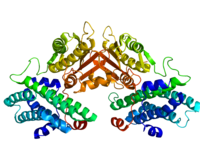
Photo from wikipedia
Studies on biological functions of N6-methyladenosine (m6A) modification in mRNA have sprung up in recent years. We find m6A can positively regulate the glycolysis of cancer cells. Specifically, m6A-sequencing and… Click to show full abstract
Studies on biological functions of N6-methyladenosine (m6A) modification in mRNA have sprung up in recent years. We find m6A can positively regulate the glycolysis of cancer cells. Specifically, m6A-sequencing and functional studies confirm that pyruvate dehydrogenase kinase 4 (PDK4) is involved in m6A regulated glycolysis and ATP generation. The m6A modified 5′UTR of PDK4 positively regulates its translation elongation and mRNA stability via binding with YTHDF1/eEF-2 complex and IGF2BP3, respectively. Targeted specific demethylation of PDK4 m6A by dm6ACRISPR system can significantly decrease the expression of PDK4 and glycolysis of cancer cells. Further, TATA-binding protein (TBP) can transcriptionally increase the expression of Mettl3 in cervical cancer cells via binding to its promoter. In vivo and clinical data confirm the positive roles of m6A/PDK4 in tumor growth and progression of cervical and liver cancer. Our study reveals that m6A regulates glycolysis of cancer cells through PDK4. Dysregulation of N6-Methyladenosine (m6A) is associated with cancer progression. Here, authors show that m6A methylation of pyruvate dehydrogenase kinase 4 (PDK4) positively regulates its mRNA stability and translation, and consequently affects glycolysis in cancer cells
Journal Title: Nature Communications
Year Published: 2020
Link to full text (if available)
Share on Social Media: Sign Up to like & get
recommendations!